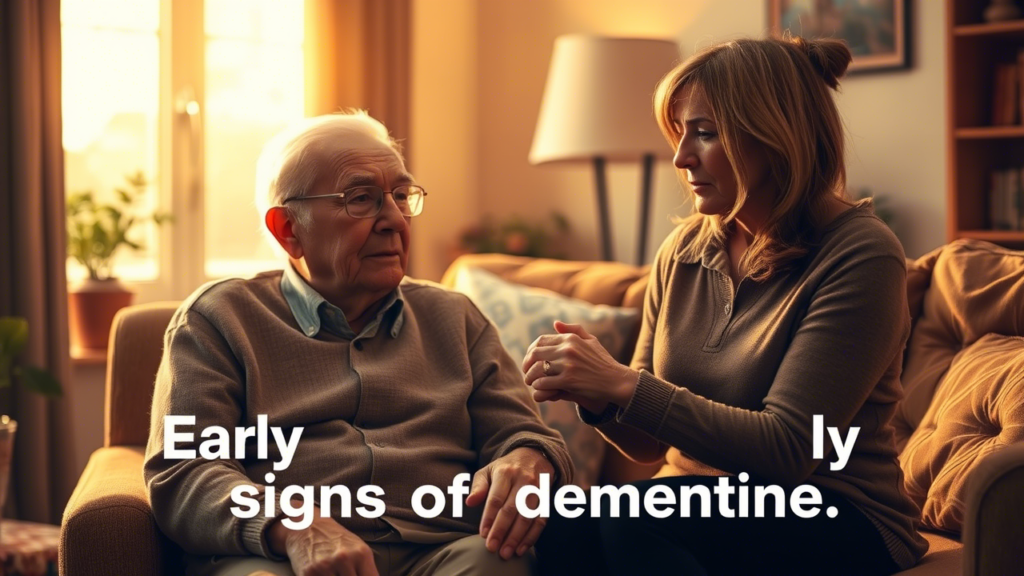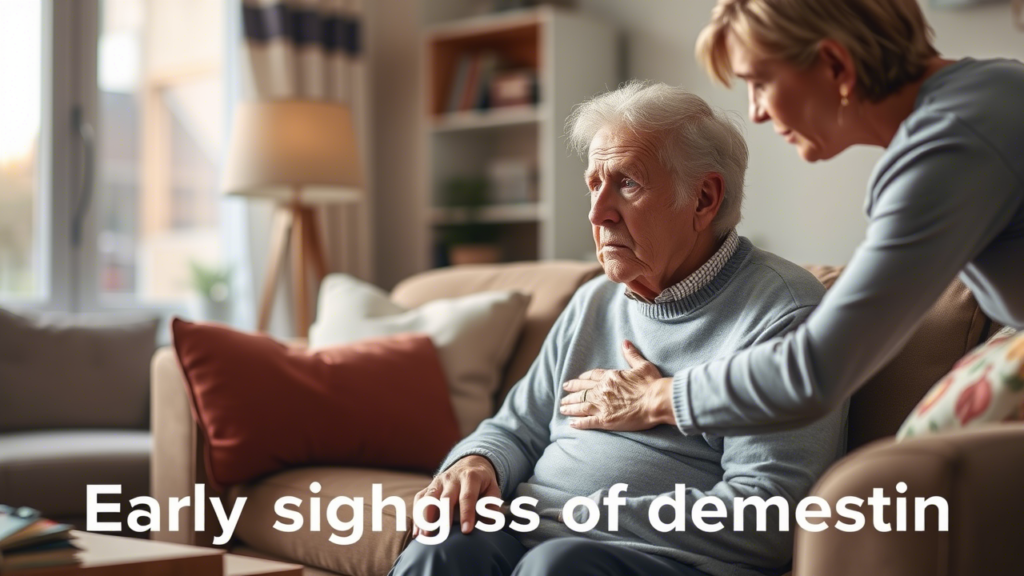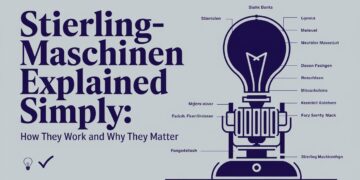Imagine watching a loved one drift slowly into confusion, misplacing not just their keys—but parts of themselves. It’s subtle at first. A forgotten name here, a confused look there. You tell yourself it’s just aging. But deep down, something feels… off.
You’re not alone in that worry.
Millions of families face this fear every year, wondering: Is this normal forgetfulness—or the start of something more serious?
In this article, we’ll break down 4 key warning signs of dementia, with an honest look at why #2 is particularly alarming. Whether you’re worried about a parent, a partner, or even yourself, this guide will help you recognize the signs early—and take action when it matters most.
Let’s dive in.

What Is Dementia, Really?
Before we talk about the signs, let’s clarify what dementia actually is—and isn’t.
Dementia isn’t a single disease. It’s a syndrome—a collection of symptoms that interfere with daily life, mostly related to memory, thinking, and social abilities. Alzheimer’s disease is the most common cause, making up 60% to 80% of dementia cases.
But here’s the scary part:
Researchers say brain changes linked to dementia can begin decades before symptoms appear.
That’s why spotting early warning signs is so crucial.
1. Memory Loss That Disrupts Daily Life
It’s more than just misplacing your phone.
Everyone forgets things from time to time—where you parked, someone’s birthday, the name of your middle school gym teacher. That’s normal.
But when memory loss starts affecting your daily routine, it’s time to pay attention.
What to Watch For:
- Asking the same questions over and over
- Forgetting important dates or events
- Relying heavily on notes or family to remember basic things
Real-life example:
Your dad forgets he already ate lunch—and starts prepping a second meal. Not just once, but three times this week. That’s not just forgetfulness. That’s a red flag.
2. Difficulty Completing Familiar Tasks
(Here’s why this one is downright scary)
This is the sign that often catches people off guard—and it’s why we’re labeling it as the scary one.
Imagine this:
Your mom, who used to bake birthday cakes from scratch with her eyes closed, suddenly can’t remember the steps. She stares at the mixer like it’s a foreign object. Or she gets halfway through a recipe and gives up, confused.
This isn’t just about memory—it’s about losing the ability to navigate the world you once knew intimately.

SEO-Friendly Table of Biography for the Keyword
| Field | Information |
|---|---|
| Keyword | 4 warning signs of dementia (#2 is scary) |
| Search Intent | Informational — users want to learn key signs of early dementia |
| Content Type | Listicle-style blog post |
| Tone | Informative, conversational, emotionally engaging |
| Target Audience | Adults aged 30–65+, caregivers, people concerned about aging or memory loss |
| Emotional Hook | Curiosity and concern — “#2 is scary” implies an alarming or shocking symptom |
| Content Format | 1000+ word blog post, listicle, includes subheadings and examples |
| Related Keywords | Early signs of dementia, dementia symptoms, Alzheimer’s warning signs |
| Top Synonyms Used | Cognitive decline, memory loss, confusion, behavior changes |
| Ranking Opportunities | Featured snippets, People Also Ask (PAA), search-rich listicles |
| Trending Factor | Dementia awareness and aging population statistics in 2024–2025 |
| Competitor Content | Guides, personal stories, checklists, medical blogs |
| Ideal Publishing Time | Health awareness months (e.g., Alzheimer’s Awareness Month in November) |
Why It’s Alarming:
This sign reflects deterioration in the brain’s ability to process sequences and handle multi-step tasks. It’s not just forgetting—it’s a deeper breakdown in function.
Common Examples:
- Trouble managing a budget or balancing a checkbook
- Difficulty driving to a familiar place
- Confusion while following a recipe or operating appliances
When someone starts struggling with the basics of their own daily rhythm, that’s when dementia starts reshaping their world—and yours.
3. Language Problems and Conversations Gone Awkward
It’s not just “losing your words.”
Have you ever had a conversation with someone and they suddenly stop mid-sentence, confused about what they were saying? Or they call everyday objects by the wrong name—like referring to a “watch” as a “wrist clock”?
Dementia often disrupts language centers in the brain, making conversations challenging.
Warning Signs:
- Trouble finding the right words
- Repeating themselves
- Struggling to follow or join conversations
- Calling things by incorrect names
These changes often lead to frustration—both for the person experiencing them and their loved ones.

4. Changes in Mood, Personality, or Social Withdrawal
They’re not “just being cranky.”
This one is sneaky—and often mistaken for depression or aging grumpiness.
A once-outgoing person becomes withdrawn. Someone who was always gentle suddenly lashes out in anger. A bubbly grandmother grows suspicious, accusing her neighbors of stealing.
These shifts can be early signs of dementia, especially frontotemporal dementia, which affects behavior and emotional control.
What to Look For:
- Apathy or loss of interest in favorite activities
- Sudden mood swings
- Increased anxiety, depression, or suspicion
- Social withdrawal
These aren’t just mood issues—they’re changes rooted in neurological damage.
But Wait… Isn’t This Just Normal Aging?
That’s the tricky part.
Dementia symptoms can mimic normal aging, but the key difference is how much they interfere with daily life.
- Normal aging = forgetting a name, then remembering it later.
- Dementia = forgetting names, faces, appointments, and never remembering.
If you or a loved one is showing more than one of these signs, it’s worth having a conversation with a doctor. Early diagnosis means more time to plan, better treatment options, and support.
Why Early Detection Matters
Right now, there’s no cure for dementia—but that doesn’t mean there’s no hope.
With early detection:
- You can start treatment to slow progression
- Families can prepare financially and emotionally
- Safety measures (like driving restrictions) can be implemented sooner
- You can plan for meaningful moments while clarity remains
And with cases of dementia expected to double in places like Nova Scotia by 2050, being informed isn’t just smart—it’s essential.
Final Thoughts: Don’t Ignore the Signs
Dementia doesn’t show up overnight. It creeps in quietly, wearing the mask of forgetfulness, fatigue, or even aging. That’s why knowing these early warning signs—especially the deeply concerning #2—can make all the difference.
If something feels off, trust your gut. Start the conversation now.
You’re not being paranoid. You’re being proactive.

TL;DR – The 4 Warning Signs of Dementia:
- Memory loss that disrupts daily life
- Difficulty completing familiar tasks (This is the scary one!)
- Language struggles in speaking or understanding
- Mood or personality changes and social withdrawal
Need support or more info?
Check out resources from the Alzheimer’s Association or talk to a healthcare provider.
The earlier you act, the more you can protect the moments that matter.



















































